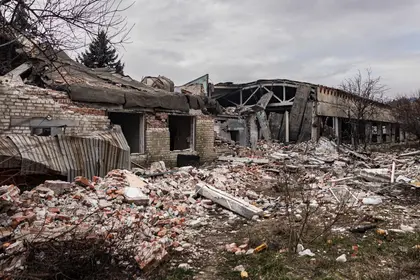Olena Morozova had endured months of bombardment in what has become the most gruelling battle of the war in Ukraine for the city of Bakhmut, but on Thursday, she said she had finally had enough.
“You go out into the yard -- bullets whistle over your head. My hands are shaking. I couldn’t stand it anymore,” she told AFP at a humanitarian hub as she waited alongside her belongings to be evacuated.
JOIN US ON TELEGRAM
Follow our coverage of the war on the @Kyivpost_official.
Her son had begged the 69-year-old to leave the besieged town, where a few thousand residents out of the pre-war 70,000-strong population shelter in basements and rely on aid.
Fighting in and around Bakhmut has been fierce and grinding, particularly on the eastern side of the Bakhmutka river that bisects the city. But, in recent days, Russia has said its forces have made another push in the city, having taken the nearby town of Soledar.
“I thought about going two weeks ago, but I couldn’t decide,” Morozova said. “And now we know that they (the Russians) are already approaching, they are already on the border of the city, not far from us, and we did not want their presence in our lives.”
While many residents had been holding out in the face of near-constant shelling, Tetyana Scherbak, said more people were leaving in recent days.
Scherbak, 51, is a volunteer with the non-profit Unity of People group which has set up humanitarian hubs in the city.

EU Transfers €1.5 Bln Raised From Russian Assets for Ukraine
“There are a lot more people to evacuate because the number of attacks increased,” she said. “The Russians came very close to the city, so there has been a lot more destruction and many houses were destroyed,” she said, adding that freezing temperatures have forced out some residents.
“It’s winter now. People stayed as long as they had homes.”
But leaving has its own hazards.
- ‘No more strength’ -
When Morozova and her neighbour, with whom she had been sheltering in the east of the city, decided to evacuate, they left under the cover of darkness when shelling was lighter.
After lugging bags strapped to metal trolleys along precarious river crossings to the city centre, they hunkered down at the hub for the night.
They then piled into cars sent to ferry evacuees to Kramatorsk, some 30 kilometres (19 miles) away, and beyond.
“We’ve had our things ready to leave for a month,” she said, but she could not face being uprooted.
“I’m already old -- it’s a pity to leave the house and everything else. But now there is no more strength to endure it.”
Natalia and her mother Valentyna had made the same journey from the east on Thursday morning -- packing up their cat, radio and a few belongings.
“We stayed because it was tolerable. Yesterday it was said that Ukrainian forces left Soledar and Soledar is very close to us,” said Valentyna, 73.
As they were choosing to leave, Natalya said civilians were being evacuated to areas behind Russian lines from the other end of the road she lived on.
Her own family has been divided by the war. She parted ways with her ex-husband “on political grounds”, she said. “He was for the new (pro-Russian) authorities.”
Even as she stood waiting to be evacuated, she was reluctant to abandon her birthplace and worried about what would be left of her home and shop if she ever returns.
“I don’t understand what I lived 50 years for,” she said. “I’ll have to start all over again.”
You can also highlight the text and press Ctrl + Enter






